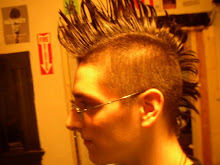Master switches found for adult blood stem cells
http://www.physorg.com/preview90257288.html
Johns Hopkins Kimmel Cancer Center scientists have found a set of "master switches" that keep adult blood-forming stem cells in their primitive state. Unlocking the switches' code may one day enable scientists to grow new blood cells for transplant into patients with cancer and other bone marrow disorders."
This should allow us to defeat leukemia and other dysplastic disorders.
While I'm here, I want to consider what tactics I might use against someone mangled in a serious auto accident. I am going to presume a critical but stable condition with a severed leg, organ damage, shattered bones in the arm.
If the organ is stable enough, I may seek to have the patient's stem cells or a sample of the organ or combo grown into a new organ for the patient, which could take weeks. If necessary, a 'flash organ' could be installed in its place with immune system suppressors until the patient's new organ could be grown and harvested for implantation. This organ would be difficult to reuse because of the prevalence of viral infections and other contaminations. A simple mechanical device could suffice, or blood dialysis, or other temporary methods for most organs for this duration. A 3D printer using stem cells on a protein framework with a tiny sample or spattering of samples of the organ inside to guide cell growth might be just the thing to produce the replacement. These master switches will be found for all kinds of stem cells and cell types, as surely as there is DNA and intracellular chemical messengers. Cell growth may be speeded by using electromagnetic fields.
We may also want to study the unique magnetic field emitted by each cell type and each organ, and by various states of illness.
Immunology is an important part of healing and growth. How could an organ or our stem cells grow quickly or well if they were not in our presence? They are not designed to grow away from us. E.g. a person's sperm will reactivate and swim towards them after time when they approach it, but not towards other people.
This should allow us to defeat leukemia and other dysplastic disorders.
While I'm here, I want to consider what tactics I might use against someone mangled in a serious auto accident. I am going to presume a critical but stable condition with a severed leg, organ damage, shattered bones in the arm.
If the organ is stable enough, I may seek to have the patient's stem cells or a sample of the organ or combo grown into a new organ for the patient, which could take weeks. If necessary, a 'flash organ' could be installed in its place with immune system suppressors until the patient's new organ could be grown and harvested for implantation. This organ would be difficult to reuse because of the prevalence of viral infections and other contaminations. A simple mechanical device could suffice, or blood dialysis, or other temporary methods for most organs for this duration. A 3D printer using stem cells on a protein framework with a tiny sample or spattering of samples of the organ inside to guide cell growth might be just the thing to produce the replacement. These master switches will be found for all kinds of stem cells and cell types, as surely as there is DNA and intracellular chemical messengers. Cell growth may be speeded by using electromagnetic fields.
We may also want to study the unique magnetic field emitted by each cell type and each organ, and by various states of illness.
Immunology is an important part of healing and growth. How could an organ or our stem cells grow quickly or well if they were not in our presence? They are not designed to grow away from us. E.g. a person's sperm will reactivate and swim towards them after time when they approach it, but not towards other people.

